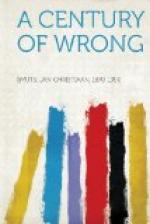The practical effect has been that our case has been lost by default before the tribunal of public opinion. That is why I feel compelled to state the facts which have characterised the attitude of the British towards us during the Nineteenth century. Naboth’s title to his vineyard must be cancelled. The easiest way of securing that object, according to the tortuous methods of British diplomacy, was to prove that Naboth was a scoundrel and Ahab an angel. The facts which have marked Ahab’s career have been stated. I shall now proceed to draw my conclusions, which I submit must appeal irresistibly to every impartial and right-minded person.
During this century there have been three periods which have been characterised by different attitudes of the British Government towards us. The first began in 1806, and lasted until the middle of the century. During this period the chief feature of British policy was one of utter contempt, and the general trend of British feeling in regard to our unfortunate people can be summarised by the phrase, “The stupid and dirty Dutch.” But the hypocritical ingenuity of British policy was perfectly competent to express this contempt in accents which harmonised with the loftiest sentiments then prevailing. The wave of sentimental philanthropy then passing over the civilised world was utilised by the British Government in order to represent the Boers to the world as oppressors of poor peace-loving natives, who were also men and brethren eminently capable of receiving religion and civilisation.
It may seem inexplicable that the Power which stood up boldly at the Treaty of Utrecht as the shameless champion of negro slavery was the very one which was celebrated in South Africa for its morbid love of the natives; the explanation, however, is that it was not so much love for the native that underlay the apparent negrophilistic policy as hatred and contempt of the Boer. As a result of this hatred of the Boer, disguised under the veneer of philanthropy in regard to the aborigines, the natives were employed as police against us; they were provided with arms and ammunition to be used against us; they were incited to fight us, and, wherever it was possible, they murdered and plundered us. In fact, our people were forced to bid farewell to the Cape Colony and all that was near and dear to them, and seek a shelter in the unknown wilderness of the North.
As an ultimate result of this hatred, our people had to pursue their pilgrimage of martyrdom throughout South Africa, until every portion of that unhappy country has been painted red with the blood, not so much of men capable of resistance as with that of our murdered and defenceless women and children.
The second period lasted until the year 1881. The fundamental principle then underlying British policy was no longer one of unqualified hatred. Results had already proved that hatred was powerless to subdue the Africander; it had, on the other hand, contributed largely to the consolidation of Africanderdom and to the fact that they spread over the whole of South Africa, thus forming the predominant nationality almost everywhere. In a moment of disinterestedness or absent-minded dejection England had concluded treaties with the Boers in 1852 and 1854, by which they were guaranteed in the undisturbed possession of certain wild and apparently worthless tracts of territory.




